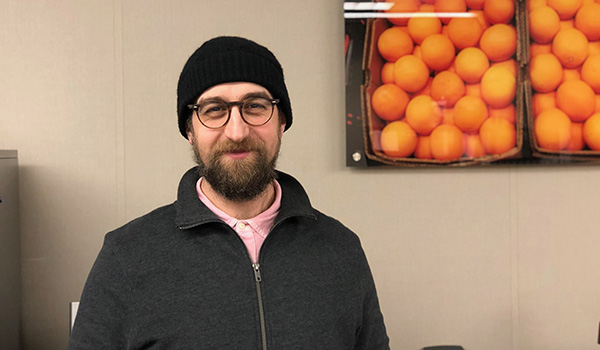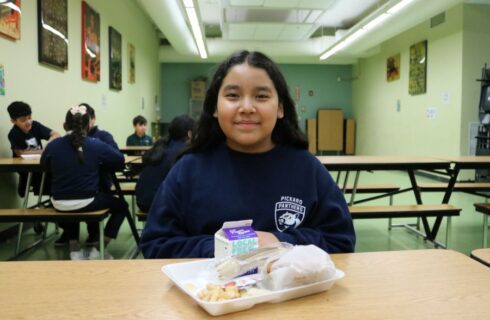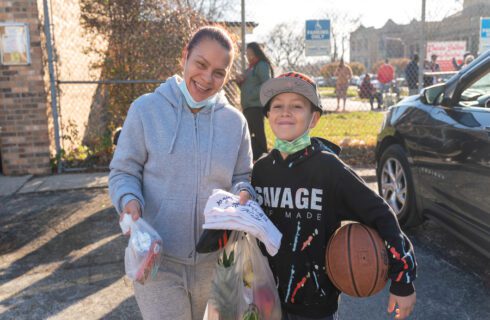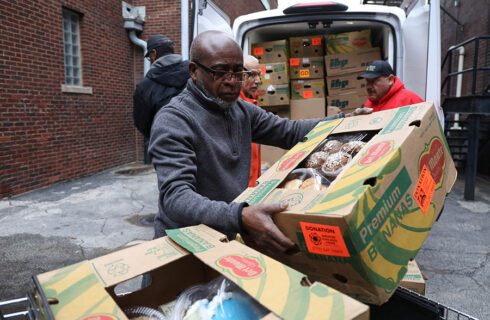Questions and Answers with Michael Goss, the Food Depository’s food safety expert
By Greg Trotter When federal health officials warned consumers to not eat romaine lettuce last month because of possible E. coli contamination, restaurants and grocery stores scrambled to stop selling the popular leafy green. Consumers quickly adjusted their holiday menus. And, of course, the Greater Chicago Food Depository responded as well, suspending distribution of romaine to our more than 700 partner agencies and tossing out existing product in inventory. Following guidance from the Centers for Disease Control and Prevention and the Food and Drug Administration – the two federal agencies that track foodborne illnesses – the Food Depository has since reinstated distribution of romaine as long as it’s from regions verified as safe.
Michael Goss is the Food Depository's manager of food safety.
Q. When there is a food safety recall, or even a more general warning like there was with romaine lettuce, how does the Food Depository respond? A. We become aware of recalls and advisories in real time. Between myself and inventory control, we’re seeing multiple recalls a week. We have processes and procedures, but the first thing we do is we gather and we look at the supply chain. And we say: What is the product? Where does it come from? Have we ever had it? How much? Where did it go?
The very first thing is gathering and identifying that product. We receive a lot of information up front. For instance, for every recall we receive notifications from Feeding America to let us know whether the network itself has distributed that product. It’s a very strict procedure that we follow and many departments are involved.
Q. You said we’re seeing multiple recalls a week. Are they mostly packaged products or do they vary? A. It varies. We are seeing that most recalls are due to mislabeling or misbranding of undeclared allergens. Mislabeling is a huge concern.
With anything food safety related, our mindset is preventative, not reactionary. The very first thing we do is try to ensure all the product we’re bringing in is from reputable sources and that our donation procedures are safe to ensure we’re distributing wholesome food.
Q. What steps do we take to make sure that our partner agencies are aware and not distributing those goods? A. With anything food safety related, our mindset is preventative, not reactionary. The very first thing we do is try to ensure all the product we’re bringing in is from reputable sources and that our donation procedures are safe to ensure we’re distributing wholesome food. And in ideal cases when it comes to recalls, we identify and remove those products before they even go to agencies.
But sometimes, recalls hit after we’ve distributed those products. It’s rare but it happens. We could do any number of things depending on when the recall happens. It could be putting a notification out on our agency resource page. It may be directly contacting agencies or specific agencies that received the products. It’s really on a case-by-case basis.
Q. Why does it seem like there are so many more food recalls than they’re used to be? A. The FDA and the CDC – they’re doing a better job of tracking it. There are just more resources available to find the food safety issues. Traceability throughout the supply chain is getting better, which is a good thing. It seems like with recalls, especially with mislabeling, the reaction time is a lot faster than it was as well.
Q. With the romaine lettuce, that was a warning as opposed to a recall. What’s the difference? A. A specific recall will be traced to a specific product or products in the marketplace that are found to be dangerous for consumption. With this romaine advisory, it was based on the investigation of an E. coli outbreak that’s presumed to be from romaine lettuce. You can’t really recall all romaine from the marketplace. You’re looking for that product that’s potentially dangerous.
Q. How did the romaine warning affect the Food Depository’s operations? A. We did suspend distribution of romaine. Fortunately, we had distributed very little romaine recently and had very little inventory to remove. It did not affect us too severely. We were able to respond to it extremely quickly.
Q. What do you think most people don’t understand about food recalls? A. I think there’s a bit of a perception that it’s really up to the public to prepare their food properly and ensure food safety. And that takes a lot of the onus off of manufacturer, the distributor, and I think that’s entirely wrong. I think the growers, the manufacturers, the distributors have to do the absolute best that they can.
Q. Do you think food safety, in general, is getting better? A. I think it’s getting a lot better. I think people are paying a lot more attention to it. Fifty years ago, you might have gone to the doctor and they would have said, You have a stomach flu, go home and rest up. Now they’re actually looking at the bacteria itself and diagnosing properly, which is important. I also think one of the big things now is social media, which can be used to identify where these outbreaks are happening. If you have 100 people talking about how they contracted salmonella from eating at X restaurant, it’s going to give you some valuable information. It’s definitely getting better.
Share This Post



